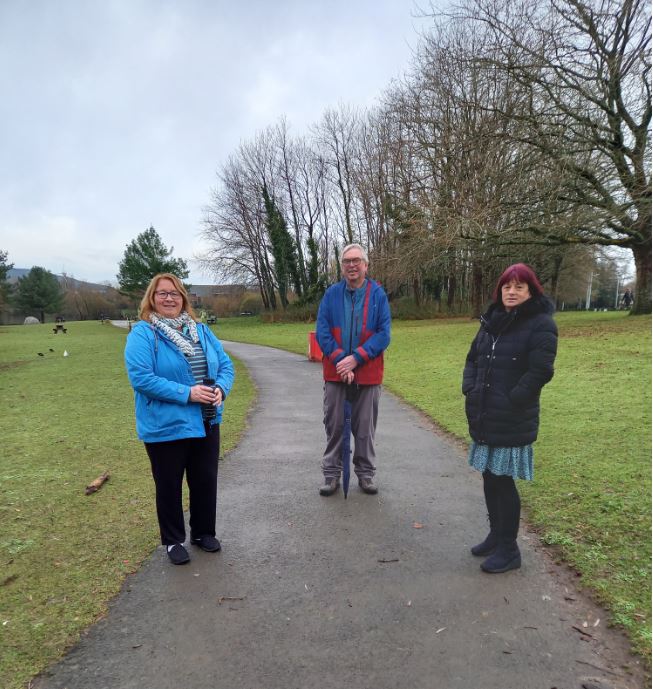People suffering with long Covid symptoms are benefiting from getting out in the great outdoors as part of their ongoing recovery.
A new walking group sees those taking part exercising at their own pace as they are accompanied along the route by a GP and a physiotherapy assistant practitioner.
Patients who have been referred to the Long Covid Rehabilitation Service, which runs from the Bay Field Hospital, are invited to take part in the weekly walks as an extension of the support available to them.
The service supports patients to return to their daily activities by offering rehabilitation that aims to understand and improve each person’s health and well-being.
The official term is post-Covid-19 syndrome, which is defined as signs and symptoms that develop during or after an infection consistent with Covid-19, continue for more than 12 weeks and are not explained by an alternative diagnosis.
The walking group, which runs in collaboration with the National Exercise Referral scheme, meets at Fendrod Lake, in Swansea. It offers an opportunity for those with long Covid to continue accessing support from medical professionals, as well as from each other.
The health board’s community-based approach to long Covid rehabilitation aims to help patients close to their homes in ways that best aid their recovery.
Dr Kate Holliman, a GP with a special interest in lifestyle medicine, created the group after seeing patients benefitting from the social connections made during the rehabilitation sessions.
She wanted to help patients access the benefits of spending time outdoors in a supportive environment.
Dr Holliman, who leads the walks each week, said: “I created the group after seeing the success of the long Covid rehabilitation groups and the marked improvement in patients who had been struggling with symptoms for months.
“The walking group is great for peer support as people with long Covid can often feel quite isolated because many people don’t understand it.
“Patients find it really useful having other people, as well as health care professionals, who understand them.
“The walks also act as a drop-in session for advice as they don’t have to come every week. They can get advice from me as a GP or from one of our physiotherapists.”
Alison Gabrielsen is just one of the people to benefit from the six-week rehabilitation course and, more recently, the weekly walks.
The 56-year-old, from Swansea, contracted Covid-19 in November 2020 and for the past year has been struggling with breathlessness, fatigue and daily headaches.
“I didn’t have any symptoms at the beginning but after about eight days it hit me,”Alison said. “I had headaches, earaches, I lost my sense of smell and taste, it affected my breathing and I had a cough.
“My taste and smell have both come back but some foods still don’t taste the same. The breathlessness and fatigue have been the worst.
“There are times when you think ‘am I going mad?’ because some days you feel fine and others you don’t. I have felt so low thinking there will never be an end to it.”
Not only has the exercise helped to improve Alison’s breathlessness but she said being around other people experiencing similar symptoms has also been beneficial.
She added: “Going on the weekly walks you’re with people who are going through the same thing as you, so you’re not alone.
“Most of what you have experienced, they have experienced as well. Everyone has been so supportive.
“Exercising has helped my breathing a lot and the talks we’ve had have helped to understand what’s going on in your body.
“The support I’ve received has been marvellous.”
Helen Purcell, has also been making the most of the walking group and said that talking to medical staff, as well other people experiencing long Covid, has boosted her confidence.
The 58-year-old, who has had Covid-19 twice in the last year, said: “I had Covid in December 2020 and I’ve had it again since. My breathing was the worst thing and I had a little cough.
“My eyesight has been terrible since then and I’ve been getting terrible headaches, vertigo and I’ve been so exhausted.
“As time went on I went into a depression and had anxiety where I didn’t like to go anywhere on my own.
“I’ve found the support from the walking group fantastic. It’s fun and you can go at your own pace. I’ve found it’s given me more confidence and I’ve learned so much.
“We encourage each other and it gives you more of a structure to your day. It has been very beneficial to be around other people feeling like me.”
While the walking group offers patients the chance to share their experiences of long Covid with each other, it also acts as an opportunity to exercise outdoors.
Dr Holliman added: “It’s great because the patients are getting fresh air and getting out into nature to exercise.
“Gentle exercise has benefits for our mental and physical health.
“Long Covid patients often suffer with their sleep and one way to improve sleep is to get regular exercise and regular daylight.
“Spending time in nature has been shown to improve your mood, memory, concentration and immune system.”
Nicola Perry-Gower, pulmonary rehabilitation clinical lead, said: “The walking and talking groups are a great opportunity to continue with a person’s rehabilitation after completing the post-Covid-19 syndrome course.
“It encompasses the power of exercise and the benefit of talking therapies.”
It is hoped that the support on offer from both health professionals and others experiencing long Covid symptoms will help people to return to work and their daily activities.
Alison Clarke, assistant director of therapies and health sciences, said: “Although this refers to a walking group, the clinical focus is not just on the physical exercise. This approach offers the opportunity for people to share experiences, fears and solutions.
“Being listened to and communicating with others provides reassurance and builds confidence.
“The symptoms associated with long Covid can have a huge impact on people’s lives, the symptoms are varied and can fluctuate.
“I’m delighted that the multi-professional team are making rehabilitation more accessible and are committed to supporting people to return to work and to re-engage in activities they enjoy, improving their health and well-being.”








Leave a Reply
View Comments